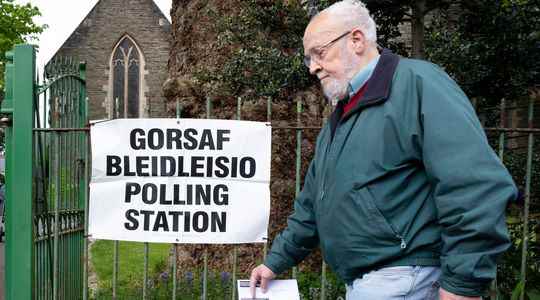The bell rang at 6 a.m. local time on Thursday morning. From England to Wales via Ireland and Scotland, the 67 million British voters are called to join the polling stations, which will close this evening at 9 p.m. Historically little mobilizing, the poll of the local elections, calling into play 6,900 seats of local councilors, could give birth to major lessons for the national political scene. Weakened by the “party gate” scandal where he broke the containment rules he himself imposed during the Covid-19 crisis, Prime Minister Boris Johnson could be the source of a heavy defeat for his side. The Conservatives, who have controlled the British parliament since 2010, could see their hegemony weakened over domestic politics.
The gaze of observers will also be on Northern Ireland, where the Republican party Sinn Fein is the favorite of the local Assembly for the first time in the 100-year history of the British province. Against a backdrop of trade and identity tensions linked to the consequences of Brexit, the arrival of this party in favor of reunification with the Republic of Ireland at the head of the local parliament could cause an earthquake in the United Kingdom. We summarize all the issues of these local elections, the first results of which will be known overnight from Thursday to Friday.
- Why is this election important?
Several months after the revelations of parties held at Downing Street, the residence of the British Prime Minister, during several confinements, voters will express themselves at the polls for the first time since the start of the Covid-19 crisis. Appointed three years ago at the head of the country, Boris Johnson will be judged via the ballot box on the results of his management of the health crisis and its economic consequences on the most modest households, as well as on the effectiveness of his commitment in Ukraine. If the Prime Minister has bet on his interventionism during the campaign, in particular by highlighting the arms deliveries orchestrated by his administration, he is severely criticized for his inability to curb galloping inflation. The government’s measures to thwart it are considered insufficient by the opposition.
Above all, these local elections could cause Boris Johnson to lose the political balance in the Assembly which keeps him in power. In the event of poor results, some deputies of the majority, hitherto wait-and-see, could join the opposition movement within the conservative camp. This had been formed after the revelations of the nocturnal festivities of the leader. The extent of the defeat of the majority party or the surprise of its victory will give an idea of the damage of the “party gate” scandal.
- Who could benefit from the deadline?
Labour, the main opposition party, intends to take advantage of the mistakes of its rival, despite the accusations brought against its leader, Keir Starmer, 59, himself suspected of having broken health rules for having shared beers and curries with his team during a trip to April 2021. The Labor Party intends to make the switch and win traditionally conservative seats, especially in the capital. The districts of Westminster, Wandsworth, Kensington and Chelsea were pampered during the campaign by Labor troops.
Keir Starmer also wants to reconquer his former strongholds which became conservative in the last elections, in 2019. By bringing the theme of purchasing power in the face of inflation which climbed to 7% in March, his party is eyeing the electorate on the left which has sometimes turned away from the other great British political force. Evidence of this campaign is focused on economic issues: in Dudley, in the north of England, Bob, a retired worker, tells AFP that he will vote Labor to “protest”. “What drives people crazy is the cost of living, food is getting more and more expensive, energy too,” he says.
- Why are all eyes on Northern Ireland?
In Northern Ireland, the vote could redefine the map of the entire UK. The latest polls published midweek promised an eight-point lead for Sinn Fein, a party that has not been in charge for 100 years and appears to be in favor of reunification with the Republic of Ireland. He would be ahead of the unionists of the DUP, the first party of the outgoing Assembly, in a tie with the centrist Alliance party. This victory would propel to the head of Northern Ireland a party which was the political showcase of the Irish Republican Army. An upheaval that could generate tensions, twenty-four years after the Good Friday agreements.
But for the British daily The Guardian, the prospect of an upheaval caused by the alternation is unlikely: “In practical terms, getting ahead of the DUP and winning the post of Prime Minister would not change the balance of power. Nor would it signal an increase in support for an Ireland United. Most voters prefer to stay in the United Kingdom”, deciphers the newspaper. However, it could lead to paralysis. During the last election debate on Tuesday on the BBC, the leader of the DUP, in favor of maintaining Northern Ireland in the political union of the United Kingdom, warned that his formation would refuse to form a new executive if the British government does not does not suspend the special post-Brexit status granted to the province. Michelle O’Neill of favorite Sinn Fein has accused him of ‘taking the Northern Irish hostage’. If the elections aim, in essence, to get out of divisions, this knot could be even a little more compact than a week earlier.
